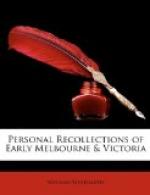I returned home as usual after the day’s work. Nothing to alarm us had even made a near approach to Melbourne, as our trees were too park-like in their wide scatter, and our grass too much cropped off by hungry quadrupeds, to expose us to any danger. But feeling unusual oppression from the singularly close heat, for I was attired in woollen clothing, not greatly under the winter woollen standard, and which, by the way, serves to confirm that our dry Australian clime is not to be measured in effect, like most others, by mere height of the thermometer, I proceeded to indulge myself, for the first time in my life, I think, with a second “refresher” of my shower-bath. Next morning accounts began to pour in from all quarters of an awful havoc, in which, sad to say, life to no small extent was lost, as well as very much property.
There has never been, throughout Australia, either before or since, such a day as Victoria’s Black Thursday, and most likely, or rather most certainly, it will never, to its frightful extent, occur again; for every year, with the spread of occupation, brings its step in the accumulation of protectives. Still these fires are a terrible and frequent evil, and even if the towns and settlements are safe, the destruction of the grand old forests is deplorable, and ere very many years will be, indeed, most sadly deplored. What between the unchecked clearances of the fires, and the unchecked clearances on the part of the colonists, I fear that those noble gum trees, the greatest and loftiest trees probably in the world, so graphically described by Mr. Froude in his recent Australian tour, will have but a poor chance. He describes also, with equal life, those dangerous forest fires, which are so especially frequent during the ever-recurring ordeals of drought, of which he had a fair sample at the time of his visit. Only think of eight miles of forest burnt in one fire which he witnessed, and such fires frequent occurrences!
Let us in time take warning by the example of the States and Canada, where, in and around the more settled parts, the magnificent primeval forest has entirely disappeared, alike from areas still unused as from those brought into use. When I travelled by rail from Montreal to Toronto, during the British Association’s Session at the former in 1884, a very large part of the way was through the monotonous and utterly wearisome scene of a second growth of miscellaneous small trees and underwood that had succeeded to the grand original. We were told of one small town which had become famous by its good taste or good fortune in having preserved in its midst one of the ancient monarchs. Well, what could be done to preserve Australian forests? We must not deprive the people of the use of these forests, for there they are for the purpose, as part of the country’s wealth, and in quantity enough for all, discreetly dealt with. I would parcel out the forests, into great clumps, marking off adequate passages between each, and only permitting for the present the latter to be dealt with. With the gradual clearing of these intervals, the reserved portions, and the colony generally, might be freed, in great measure, from the risk of fires.




